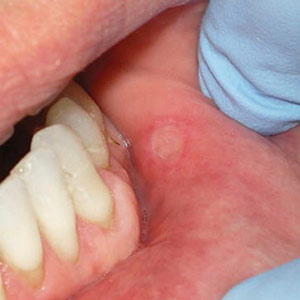
Sometimes it's the little things that can be most annoying. Those occasional small sores that pop up on the inside of your mouth are a case in point. Although in most instances they won't last long and aren't anything to be alarmed about, they can still cause you some discomfort.
These small sores are called aphthous ulcers or more commonly “canker sores.” They are breaks in the skin or mucosa, the inner lining of the mouth, and occur most often on the inside cheeks, lips, tongue and occasionally on the soft palate at the back of the throat. They usually appear round with a yellow-gray center and an intensely red outer ring or "halo."
Canker sores often appear during periods of high stress or because of minor trauma, and usually last for a week or two. They often have a tingling pain that can be aggravated when you eat and drink acidic or spicy foods and beverages. About 20 to 25% of people have a form known as recurrent aphthous stomatitis (mouth inflammation) that occurs regularly with multiple sores and heightened pain.
It's possible to manage the discomfort of minor, occasional bouts with a number of over-the-counter products that cover the sore to protect it and boost healing, with some providing a numbing agent for temporary pain relief. For more serious outbreaks we can also prescribe topical steroids in gels or rinses, injections or other medications.
While canker sores don't represent a health danger, there are instances where you should take outbreaks more seriously: if a sore hasn't healed after two weeks; if you've noticed an increase in pain, frequency or duration of outbreaks; or if you're never without a sore. In these cases we may need to biopsy some of the tissue (and possibly run some blood tests) to ensure they're not pre-cancerous or cancerous.
In any event, we can work with you to reduce your symptoms and help the sores heal quickly. This particular “little thing” in life doesn't have to stress you out.
If you would like more information on mouth sores, please contact us or schedule an appointment for a consultation. You can also learn more about this topic by reading the Dear Doctor magazine article “Mouth Sores: Understanding and treating canker sores.”
